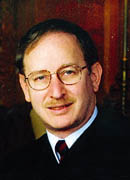Troy-based law firm Frank, Haron, Weiner and Navarro, in conjunction with the United States Department of Justice, today announced a settlement in the amount of $75,370,000 for a lawsuit filed in 2003 against Raritan, N.J.-based pharmaceutical firm Ortho-McNeil-Janssen Pharmaceuticals, Inc. (“OMJPI”). The announcement was made by the Chair of the firm’s False Claims Act practice David Haron and co-lead counsel Monica Navarro.
Filed in August of 2003 under the qui tam provisions of the federal False Claims Act (Title 31 United States Code, Section 3729) on behalf of Angela Maher and Anastasia (Stacey) Savka-Klovski — each of whom reside in metropolitan Detroit — the lawsuit alleged that OMJPI acted improperly concerning the marketing, promotion and sale of the anticonvulsant drug Topamax®. In December of 2003, Dr. Gary R Spivack, represented by the Washington, D.C.-based law firm Phillips & Cohen, filed a similar lawsuit. The cases were consolidated and the settlement referenced here resolves both cases.
The settlement refers to government claims that OMJPI “illegally marketed Topamax® by, among other things, promoting the sale and use of Topamax® for a variety of psychiatric conditions other than those for which its use was approved by the Food and Drug Administration, (i.e. “off-label” uses).”
It also states that “certain of these uses were not medically-accepted indications for which State Medicaid programs provided coverage” and that as a result “OMJPI knowingly caused false or fraudulent claims for Topamax® to be submitted to, or caused purchase by, Medicaid, the TRICARE Program (formerly known as the Civilian Health and Medical Program of the Uniformed Services), the Federal Employees Health Benefits Program (“FEHBP”), and the Department of Veterans Affairs (“DVA”).
OMJPI neither admitted nor denied liability, but OMJPI agreed to enter into a plea agreement with the government and has agreed to plead guilty to specific conduct described in the plea agreement to be filed in US vs. Ortho-McNeil Pharmaceutical, LLC, a criminal action in the District of Massachusetts.
Commenting on the settlement, Haron said, “We feel this is a fair settlement and thank Angela and Stacey for identifying the fraudulent activity, bringing it to our attention, and allowing us to work with them to stop it. My co-lead counsel, Monica Navarro, and our Associate, Maro Bush, would like to thank Colin M. Huntley, Trial Attorney, Commercial Litigation Branch, Civil Division, US Department of Justice and Zachary A. Cunha, Assistant US Attorney, US Attorney’s Office, District of Massachusetts for bringing this nearly decade-long litigation to a successful conclusion.”
“The government’s annual healthcare expenses total nearly $1 trillion. It is estimated that nearly $100 billion of that money is lost each year to fraud, waste and abuse,” continued Haron. “Only when those aware of fraud bring it to the attention of lawyers who have the resources to investigate and verify the allegations can that money be retrieved. This case is an example of how the system is supposed to work and how it will work given the increased resources and enhanced anti-fraud provisions in the health reform legislation recently signed by President Obama.”
The False Claims Act and similar state acts, such as the Michigan Medicaid False Claims Act, provides incentives to private citizens, called Relators, who discover fraud against the federal or state governments and who bring their information to the government and help pursue the defrauding entities. The qui tam provisions allow Relators to represent the interests of the government to seek damages and civil penalties for a violation of law and, if the action is successful, to receive a portion of the awarded damages.
Under the terms of this agreement, the Relators will be awarded an 18% share of the recovery by the states. In addition, the Relators and the defendant have entered into a settlement regarding attorney’s fees and costs.






































